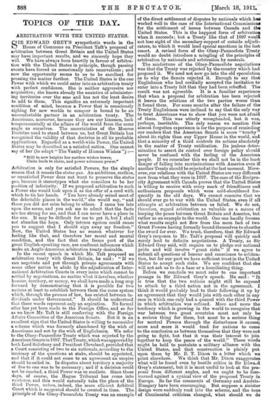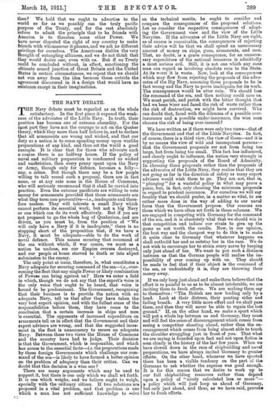TOPICS OF THE DAY.
ARBITRATION WITH I'M; UNITED STATES.
SIR EDWARD GREY'S sympathetic words in the House of Commons on President Taft's proposal of arbitration between Great Britain and the United States may have important results, and we sincerely hope they will. We have always been heartily in favour of arbitra- tion with the United States in principle, though passing events have forced us occasionally into reservations ; and now the opportunity seems to us to be excellent for pressing the matter further. The United States is the one Power with which we could enter into an arbitration treaty with perfect confidence. She is neither aggressive nor acquisitive; she knows already the anxieties of administer- ing territories over the seas and has not the least desire to add. to them. This signifies an extremely important condition of mind, because a Power that is consciously sighing for new worlds to conquer is bound to be an uncomfortable partner in an arbitration treaty. The Americans, moreover, because they are our kinsmen, look temperamentally at the affairs of the world from the same angle as ourselves. The uncertainties of the Monroe Doctrine used to stand between us, but Great Britain has recognised the validity of that doctrine in all its probable applications. Regarded as a. world-wide Power, the United States may be described as a satisfied nation. One cannot say of her (to adapt " The Vanity of Human Wishes ") "Still to new heights her restless wishes tower,
Claim leads to claim, and power advances power."
Arbitration is only for satisfied Powers, for the simple reason that it means the status quo. An ambitious, restless, or unsatisfied Power does not want to preserve the status quo, because it stereotypes what she considers to be her position of inferiority. If we proposed arbitration to such a Power she would look upon it as the offer of a cord with which to tie her hands. "You have already seized most of the delectable places in the world," she would say, " and those you did not seize belong to others. I came too late upon the scene, and you ask me to admit that the facts are too strong for me, and that I can never have a place in the sun. It may be difficult for me to get it, but I shall not abandon the hope. Only intense egoism could cause you to suggest that I should sign away my freedom." Now, the United States has no reason whatever for feeling like that, and therefore her moral and mental condition, and the fact that she forms part of the great English-speaking race, are confluent influences which make an Anglo-American arbitration treaty desirable. In the recent speech in which Mr. Taft proposed an arbitration treaty with Great Britain, he said : " If we can negotiate and put through private agreements with some other nation to abide by the adjudication of Inter- national Arbitration Courts in every issue which cannot be settled by negotiations, no matter what it involves, whether honour, territory, or money, we shall have made a long step forward by demonstrating that it is possible for two nations at least to establish between them the same system which, through the process of law, has existed between in- dividuals under Government." It should be understood that these words represent only an aspiration. No formal offer has yet been made to the Foreign Office, and so far as we know Mr. Taft is still conferring with the Foreign Affairs Committee of the American Senate. But it is an excellent sign that the United States is willing to reconsider a scheme which was formerly abandoned by the wish of Americans and not by the wish of Englishmen. We refer to the Olney- Pauncefote Treaty which was rejected by the American Senate in 1897. That Treaty, which was approved by both Lord Salisbury and President Cleveland, provided that a Court consisting of two to six nationals, according to the intricacy of the questions at stake, should be appointed, and that if it could not come to an agreement an umpire should be called in. In disputes about territorya majority of five to one was to be necessary ; and if a decision could not be reached, a third Power was to mediate. Sines those days, of course, the Hague Tribunal has come into existence, and this would naturally take the place of the third Power, unless, indeed, the more efficient Arbitral Court which is suggested should be created in time. The principle of the Olney-Pauncefote Treaty was an example of the direct settlement of disputes by nationals which heal worked well in the case of the International Commissions for the settlement of issues between Canada and the United States. This is the happiest form of arbitration when it succeeds; but a Treaty like that of 1897 would not lose sight of the secondary support of outside adjudi- cators, to which it would lend special sanctions in the last resort. A revised form of the Olney-Pauncefote Treaty would no doubt introduce a. mingling of the principles of arbitration by nationals and arbitration by neutrals.
The misfortune of the Olney-Pauncefote negotiations was that the Treaty was rejected by the country which had proposed it. We need not now go into the old speculation as to why the Senate rejected it. Enough to say that Englishmen who had cordially accepted the invitation to enter into a Treaty felt that they had been rebuffed. The result was not agreeable. It is a familiar experience that when a proposal for arbitration has been rejected it leaves the relations of the two parties worse than it found them. For some months after the failure of the Treaty Englishmen were inclined to say that the only way to treat Americans was to show that you were not afraid of them. This was utterly wrongheaded, but it was, perhaps, inevitable. The only reason we mention this almost forgotten experience is for the purpose of reminding our readers that the American Senate is more " touchy ' about its rights than any Upper House in the world, and that a minority of a third controls its actions absolutely in the matter of Treaty ratification. Its jealous deter- mination to assert its control over foreign policy should never be confused with the feeling of the American people. If we remember this we shall not be in the least danger of falling into recriminations with America even if another Treaty should be rejected at the last moment. More- over, our relations with the United States are very different now from what they were in 1897. The case of the Recipro- city Agreement with Canada proves that the United States is willing to receive with every mark of friendliness and enthusiasm proposals which were cold-shouldered fre- quently in the old days. We cannot conceive that we should ever go to war with the United States, even if all attempts at arbitration between us failed. We do not, therefore, regard arbitration as valuable as a means of keeping the peace between Great Britain and America, but rather as an example to the world. One can hardly foresee what results might not flow from the mere fact of two Great Powers having formally bound themselves to sheathe the sword for ever. We trust, therefore, that Sir Edward Grey's response to Mr. Taft's proposal will quickly and surely lead to definite negotiations. A Treaty, as Sir Edward Grey said, will require us to pledge our national pride and will involve " great risks ' if we agree to submit all questions of honour and conscience to arbitra- tion, but for our part we have sufficient trust in the United States to accept such risks. We are confident that she will not ask us to do a base or a humiliating thing. Before we conclude we must refer to one important passage in Sir Edward Grey's speech. He said : " It is true that the two nations might still be exposed to attack by a third nation not in the agreement. I think it would probably lead to their following it up by an agreement that they would join with each other in any case in which one only had a quarrel with the third Power in which arbitration was refused. More and more the tendency which is growing in the world to recognise that war between two great countries must not only be a serious thing for them, but must be a serious thing for neutral Powers through the disturbance it causes; more and more it would tend for nations to come to the conclusion as between themselves that they were not going to fight, but that it was their interest to join together to keep the peace of the world." These words might be held to postulate a military alliance with the United States, and that construction is plainly put upon them by Mr. E. T. Dixon in a letter which we print elsewhere. We think that Mr. Dixon exaggerates what will be found even by hostile critics in Sir Edward Grey's statement, but it is most useful to look at the pro- posal from different angles, and we ought to be fore- warned against a cynical view of the proposed Treaty in Europe. So far the comments of Germany and Austria- Hungary have been encouraging. But suppose a sinister design were suddenly read into the scheme, and the tone of Continental criticism hanged, what should we do then? We hold that we ought to advertise to the world so far as we possibly can the truly pacific purpose of the Treaty, and for the rest absolutely refuse to admit the principle that to be friends with America is to threaten some other Power. We have never disputed the right of any country to make friends with whomsoever it pleases, and we ask no different privilege for ourselves. The Americans dislike the very thought of entangling alliances, and we do not think that they would desire one, even with us. But if no Treaty could be concluded without, in effect, sanctioning the ultimate armed junction of Great Britain and the United States in certain circumstances, we repeat that we should not run away from the idea because those outside the agreement discovered in it a design that would have no existence except in their imaginations.











































 Previous page
Previous page